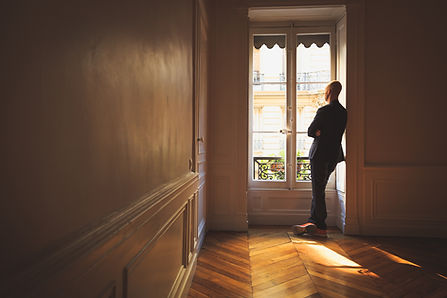
A Black Male Counselor's
Perspective

🪑 From the table where you'll always have a seat
I offer therapy from the lived perspective of a Black man who has carried weight, wrestled silence, and still chooses clarity. I’m not just a practitioner—I’m someone who knows the emotional terrain firsthand of being the 'only' in a section, division or building. This practice exists for men who are seeking something deeper than survival. It’s built for those who want to exist as they are, without apology, performance, or repair.
Here, you won’t be treated as someone broken or in need of fixing. This space isn’t about applying coping strategies to your pain—it’s about offering mental health blueprints that honor your story. Therapy becomes a tool for grounding, not escaping. You are not a checklist of symptoms. You are not a case to manage. You are a life in motion, deserving presence, intention, and respect.
Whether you’re navigating grief, identity, relationships, or pressure from all sides—this is a space built to hold you. You are invited to come as you are and stay as you need. There is no judgment, and no need for validation. I offer guidance, but I don’t govern your journey. What you find here is strategy—not control.
This approach speaks to men searching for Black male therapists, counseling for men or mental health support for fathers, brothers, friends and leaders. It’s rooted in sovereignty, not shame. Therapy isn’t a detour—it’s part of your design. And here, you’ll be seen.
Break Free From Your Mental Prison
As men, we carry emotional weight in silence. Our feelings are often either buried deep or unleashed in ways that leave damage—arguments, withdrawal, burnout, or the quiet ache we hide from everyone, including ourselves. Society tells us to tough it out, “man up,” and keep moving. But what if true strength came from facing what's inside instead of hiding it?
At Tony Hunt Counseling and Consulting, we reject the idea that emotions are weakness. We believe courage means unpacking what’s in the box—not locking it tighter. Many of us have felt lost, angry, depressed, ashamed. These aren’t signs of failure. They’re signs it’s time to shift.
Therapy for men offers more than tools—it gives you clarity, connection, and freedom. As a black male licensed therapist, I understand the emotional challenges men face and know how to navigate them. Together, we’ll identify the barriers between you and the life you’ve been craving—whether that’s speaking up at work, deepening your relationships, healing from trauma, or finally feeling at peace when you look in the mirror.
You don’t have to figure it out alone. This is a space for you to show up without pretending, without posturing, and without shame. The work is hard, but the outcome is transformative.
Start your journey toward mental strength and emotional clarity today. Schedule your men’s therapy consultation now.
Let’s Talk About the Men’s Mental Health Crisis
📊Over 6 million men suffer from depression every year
⚠️ In 2020, men died by suicide nearly 4x more than women
💥 About 6 out of 10 men experience at least one trauma in their lifetime
🍺 Men are 2x more likely to binge drink and 3x more likely to die from alcohol abuse
Only 36% of men with a mental illness actually receive treatment
👉 Those numbers aren’t just statistics—they’re warning signs. We have a crisis on our hands.
This Is Your Wake-Up Call
Men are hurting—and it's not just quiet suffering. It's costing lives.
Too many are struggling in silence, refusing to ask for help. And the stigma is so powerful, good men are dying because of it.
Tony Hunt Counseling and Consulting exists to break that cycle. We offer counseling for men, by men. We understand that talking about feelings doesn't come naturally. Most of us were taught to suppress, not express.
But here's the truth: our therapists are in your corner. This isn’t about weakness—it’s about survival. And based on the facts, seeking help might just save your life.
Let’s work together to redefine what strength looks like. Asking for help is a courageous act. The stakes are too high to stay silent.


Common Men's Issues
Anger: The Unspoken Story

This one runs deep. For many men, the only emotions we’re taught to display are happiness and anger. Talk to a guy about how he feels, and chances are he’ll say, “I’m pissed about that.” Because anger—we know that emotion well. Whether it’s a scorching outburst or a slow-burning bitterness, anger feels familiar. It feels safe. And yet, it can quietly dismantle everything around us.
We live in a culture that both fuels and silences our rage. We're told our anger is dangerous—especially to those we love. So we bury it, locking it away like toxic waste deep underground. But buried doesn’t mean gone. That anger leaks out: into our relationships, our work, our reflections in the mirror. And no matter how well we think we’ve got it contained, when we’re honest with ourselves, we know it’s still there—unprocessed, unchecked, and doing harm.
Real change starts with unpacking what’s beneath it. Therapy offers that space—not to shame the anger, but to understand it, manage it, and eventually release it in healthier ways.
Anxiety: The Wait of it is the Weight of it
Being the only Black man in the workplace isn’t just lonely—it’s exhausting. You’re expected to deliver, lead, and represent. To be confident, but not intimidating. To speak up—but not too loudly. Every move feels magnified. Every emotion, scrutinized.
That pressure creates what we call Black anxiety: the silent tension shaped by racism, high expectations, and emotional isolation. It’s waking up with a knot in your chest before your first meeting. It’s biting your tongue when someone disrespects you—because speaking out could cost you. It’s smiling when you're unraveling inside.
And anxiety in Black men often hides in plain sight. Instead of fear, it shows up as overworking, anger, avoidance, or substance use. The emotional armor we wear becomes so familiar, we forget what it feels like to be safe, seen, and soft.
But here’s the truth: strength isn’t just endurance. It’s healing. Therapy designed for Black men helps unpack all of it—the fear, the rage, the exhaustion. It offers a judgment-free space to breathe, speak, and rebuild.

Depression: The Invisible Load

Do we really have to do it all? It’s easy to feel like life demands perfection from men—be present at work, support your partner, stay fit, socialize, succeed. Always strong. Always reliable. But beneath that pressure is a silent truth: it’s exhausting. And it can feel like drowning in plain sight.
There are days when showing up feels impossible. When the thought of one more responsibility, one more conversation, one more expectation makes you want to disappear. Depression doesn’t always scream. Sometimes it whispers: “Just pack it in. Hide.”
Men are taught to lead—but not to ask for help. We’re encouraged to tough it out, to keep it together, to go it alone. But isolation only feeds the beast. Depression has been called “terminal loneliness”—a slow fading of connection, purpose, and joy. Without real support, everything turns gray.
Here’s the truth: connection is not weakness. Vulnerability is not failure. We need community. We need brothers in healing. And therapy—especially designed for men—offers that lifeline.
Divorce: Quiet suffering
Being the only Black man in the workplace isn’t just lonely—it’s exhausting. You’re expected to deliver, lead, and represent. To be confident, but not intimidating. To speak up—but not too loudly. Every move feels magnified. Every emotion, scrutinized.
That pressure creates what we call Black anxiety: the silent tension shaped by racism, high expectations, and emotional isolation. It’s waking up with a knot in your chest before your first meeting. It’s biting your tongue when someone disrespects you—because speaking out could cost you. It’s smiling when you're unraveling inside.
And anxiety in Black men often hides in plain sight. Instead of fear, it shows up as overworking, anger, avoidance, or substance use. The emotional armor we wear becomes so familiar, we forget what it feels like to be safe, seen, and soft.
But here’s the truth: strength isn’t just endurance. It’s healing. Therapy designed for Black men helps unpack all of it—the fear, the rage, the exhaustion. It offers a judgment-free space to breathe, speak, and rebuild.

Addictions: Self-Medicating

Addiction often takes root in silence—not from a lack of noise, but from the absence of safe spaces for men to express how they feel. With emotional outlets scarce, many turn to substances as a shortcut to vulnerability. That buzz, that high, can feel like emotional permission—an escape hatch from the pressure to keep it together. It's no wonder some men describe these altered states as the only times they feel fully alive.
But there's a cost. When emotional suppression meets a culture that glamorizes partying, the line between relief and dependence blurs. What started as occasional release can quietly become ritual. Before long, the fun fades and the fix takes center stage. Life begins to orbit around the next drink, the next high—celebration gives way to survival.
The truth? You deserve to feel alive without numbing yourself first. Recovery isn't just about quitting—it’s about reclaiming your right to feel, connect, and celebrate the real you. And that kind of healing is entirely possible
.

Men’s Therapy That Drives Real Change
So, how can just talking help? Men’s issues therapy helps men confront their inner struggles and start reclaiming power. By honestly examining ourselves, we begin to see where change is needed. Walking through the pain—rather than avoiding it—teaches both the body and mind that we're stronger than our secrets.
But that's not all you’ll get from working with us. Our therapists understand how the male brain works, and we know that just talking isn’t enough. That’s why therapy includes an action plan tailored to your needs—so you’re not just reflecting, but moving forward.
Men grow by doing, not just by talking. We’re here to support that growth through therapy that connects to real life. You are not alone in this.
.


